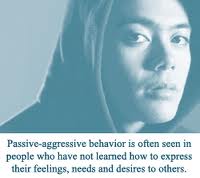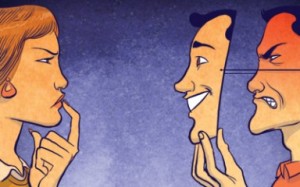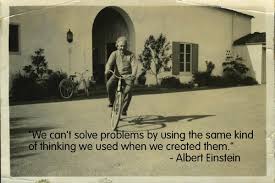
I have been amazed at the hundreds of comments I regularly continue to receive on a post called How To Cope with a Passive-Aggressive Mate (2012). People have generously shared the challenges of living with a passive aggressive romantic partner. Indeed, by all accounts, it’s a daunting task. But, it’s also difficult to be the one who has the type of fears and anxieties that lead to passive-aggressive behavior. I know it’s hard for some of us to muster up empathy for passive-aggressive people, if we’ve been on the receiving end of their behavior. But, passive-aggressive people suffer as much as the recipients of their behavior. Their self-defeating behaviors reap the wrath of their mates and damage the happiness, health and longevity of their romantic relationships.
What is passive-aggression?
Contrary to popular belief, passive aggression (PA) is not a distinct personality disorder (Psychcentral.com). It is a behavioral pattern of indirectly expressing negative feelings instead of openly addressing them. Because of this, there’s often a disconnect between what people say and do who express themselves in this way. They may openly agree with requests but passively express their resentment and opposition to the demands through procrastination, losing things or by making mistakes. They also express negativity through a cynical, sullen and hostile attitude or through chronic complaints about being devalued, taken advantage of, or cheated in someway.
These behaviors are meant to foil, frustrate and obstruct other people’s good feelings, desires and actions, with the intention of exasperating them and getting them to aggressively act out the resentment and opposition the PA person cannot express him or herself. And, PA people are great at subconsciously finding people who have a lot of anger to unload. This is why it is not easy to recognize a passive-aggressive behavior pattern in oneself. There’s always someone who is willing to take responsibility for his anger (How to Cope With a Passive-Aggressive Mate).
It takes a great deal of self-awareness to choose healthier ways of expressing frustration, upset and disagreement. Self-awareness begins with fully understanding the roots of passive aggression and the fears that reinforce it.
The Roots of Passive Aggression
 There are several childrearing situations that can promote passive aggressive behavior in children. Families dealing with the chronic stress of alcoholism, gambling, sexual abuse, domestic violence or mental illness, or immigrants trying to adapt to the ways of a new culture, may lead parents to believe that children should be seen but not heard. Also, parental narcissism can lead to a parenting style in which children have to reflect the views of their parents to gain approval.
There are several childrearing situations that can promote passive aggressive behavior in children. Families dealing with the chronic stress of alcoholism, gambling, sexual abuse, domestic violence or mental illness, or immigrants trying to adapt to the ways of a new culture, may lead parents to believe that children should be seen but not heard. Also, parental narcissism can lead to a parenting style in which children have to reflect the views of their parents to gain approval.
In each of these situations, children learn that honest self-expression is undesirable. They come to view needs, feelings and differences as demanding, disruptive, and impolite, and, at the extreme, even crazy. To avoid social rejection and disapproval, these children hide negative thoughts and feelings. They grow into adults who hold back needs, deprive themselves, and expect little or nothing in relationship.
They also develop irrational beliefs about how their behavior should be rather than what they really think and feel. For example, they should never express anger; anger is impolite, ugly, and even crazy. They should always agree; differences lead to conflict and ruin relationships. They should take a back seat to other people’s needs and come to believe that intimate relationships always involve a loss of independent thought and voice. These types of beliefs lead to passive-aggressive behavior that, on the surface, reflects these false ideas but, also gets out their anger.
The first step to overcoming passive aggressive behavior is to become mindful of the irrational beliefs that lead to it. Below are some of the irrational ideas that typify passive-aggressive thinking and rational beliefs to counter them.
- Irrational Belief: I should always be polite and civilized and keep my anger to myself.
- Rational Belief: Anger is normal self-expression; a feelings of displeasure. I need to express my frustration and anger to air views, establish boundaries, and deepen understanding between me and other people.
- Irrational Belief: Intimate relating always means a loss of independence and self-control.
- Rational Belief: The only true obstacle to independence and self-control is failing to assert views, needs, and desires in relationship.
- Irrational Belief: Agreement is better than expressing differences. Differences involve conflict that lead to disapproval and rejection.
- Rational Belief: An expression of differences air views, clear up misunderstandings, and gives chance to repair and renew relationship.
- Irrational Belief: Cooperation means taking a back seat to other people’s wishes and needs.
- Rational Belief: Cooperative interaction involves a mutual expression of needs.
- Irrational Belief: To preserve relationship, tell people what they want to hear rather than what I think.
- Rational Belief: People know when there’s a disconnect between what I say and how I truly feel. Being congruent in words, feelings and actions makes me a trustworthy person and secures relationships.
Hiding what we believe, think and feel to keep peace only leads to passive-aggressive behavior. Anger has to have an outlet. We have to take a risk and say what is on our hearts and minds. The fear of people rejecting and leaving us should not be greater than the tragedy of rejecting our true selves.
I hope today’s post helped you to understand passive-aggression better. If you liked today’s post please let me know by selecting the Like icon that follows. You can also Tweet or Google+1 today’s post, to let your friends know about it. Warm regards, Deborah








Is there a book you would recommend for passive agressive people? My husband has been diagnosed with major depressive disorder, ADD, Bi-poloar 2 and is passive aggressive. I am expressive and hot tempered and play into his games. It one day occurred to me that I was being played to react to his mean remarks so that he could twist things into being able to accuse me of being the mean bully instead of him. He’s always the victim. It’s often confusing and he has me questioning myself all the time. We’re now separated the relationship has really deteriorated. A lot less drama in the house and I have two teenagers. He loves the drama to keep everyone feeling like he does.